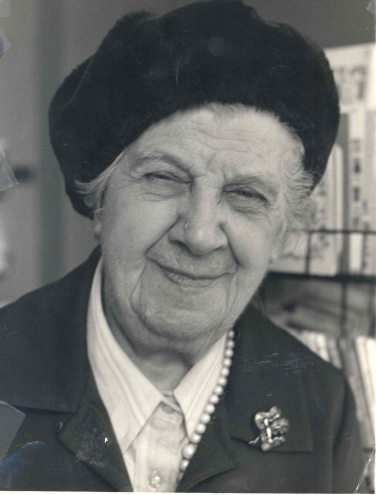Ida Siegel
 Ida Lewis Siegel (1885–1982) was instrumental in the founding and development of several prominent Jewish organizations. Active in the educational sector, she campaigned for the rights of female educators and was internationally known for her devotion to Jewish learning and her contributions to the Toronto Jewish community.
Ida Lewis Siegel (1885–1982) was instrumental in the founding and development of several prominent Jewish organizations. Active in the educational sector, she campaigned for the rights of female educators and was internationally known for her devotion to Jewish learning and her contributions to the Toronto Jewish community.
Ida Siegel was born to Samuel Lewis (b. 1859) and Hannah Ruth (Ticktin) Lewis (b. 1864) on 14 February 1885 in Pittsburgh, Pennsylvania. She was the first child to be born in the United States after her parents and two older brothers, Abe (b. 1880) and Charles (b. 1883) emigrated from Lithuania. She attended elementary school in Pittsburgh, and in 1894, she moved to Toronto with her family. On 14 February 1905, Ida married Isidore Hirsch Siegel at the Elm Street Synagogue. Isidore was a travelling peddler, and later, a storekeeper in Cochrane, Ontario. Together, they had six children: Rohama Lee (1905–?), Leah Gittel (Labovitz) (1907–2004), David Isar (1909–2004), Sarah (Sontag) (1912–1942), Avrom Fichel (1916–2010), and Rivka Hadassah (Gurau) (1923–2001).
Ida was an early and ardent Zionist. Only two years after Theodore Herzl organized the first Zionist Congress in Switzerland, and while still in her teens, Ida formed the Daughters of Zion and set the group of young women to collecting donations for the Jewish National Fund, thus creating the first women’s Zionist organization in Canada.
Ida later recognized that an important aspect of Jewish community work—providing assistance to the less fortunate—was being neglected. In response, Ida helped found a number of Jewish philanthropic and social organizations including the Herzl Girls' Club; Hadassah-WIZO Organization of Canada; the Hebrew Ladies' Sewing Circle, which developed into the Hebrew Ladies' Maternity Aid Society and Child Welfare Society; the Goel Tzedec Sunday School; the Goel Tzedec Sisterhood; the Women’s League of the United Synagogues of America in Toronto; and the YM-YWHA. With help from her brother Abe Lewis, Ida also formed the first free Jewish medical dispensary in Toronto, located on Elizabeth Street in the Ward, the forerunner to Mount Sinai Hospital.
Ida was also instrumental in the formation of a unified fundraising body for the Jewish community known as the Federation of Jewish Philanthropies, now the UJA Federation of Greater Toronto. However, she was denied a seat on the executive after campaigning for a female representative. In 1937, she ran unsuccessfully for alderman in Toronto, but remained politically active with the Association of Women's Electors and Women’s Electors of Toronto, encouraging women’s involvement in politics and championing the rights of women to hold public office.
Although her formal schooling ended in grade ten, Ida valued education and never stopped learning. She was one of the original founders of the Home and School Association in 1919, organizing the first Home and School Club among Jewish mothers. In 1930, she became the first Jewish woman to be elected to the Toronto Board of Education, a post she held for six years. She was later named honorary secretary of the Toronto Board of Jewish Education. Among her many accomplishments, Ida was responsible for bringing milk distribution into the public school system for undernourished children and campaigned for better physical and health education curriculum.
A dedicated pacifist, Ida was active in the Women's International League for Peace and Freedom from 1915 onwards, vice-president of its Toronto branch and an outspoken opponent of both world wars. In 1933, Ida fought for and won the discontinuance of mandatory cadet training in the public schools, both on ideological grounds and because she believed the money could be better spent elsewhere. Canadian involvement in the Second World War created a terrible moral dilemma for Ida, and it was a great shock to her when two of her sons, Avrum and David, enlisted.
In later life, Ida came full circle, volunteering in schools where she taught civics classes to children of immigrants. She discussed her own experience as an immigrant to Canada and her work in the immigrant community.
Ida was a pioneer in the field of charitable undertaking and a key figure in the development of the Toronto Jewish community. Her various affiliations indicate the diverse loyalties in Ida’s life and embody her deep commitment to her community and country. Ida Lewis Siegel passed away in March 1982, aged ninety-seven, an inspiration and a model for achievement.
